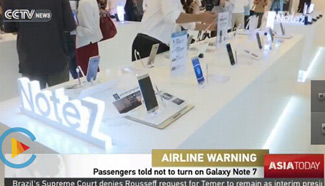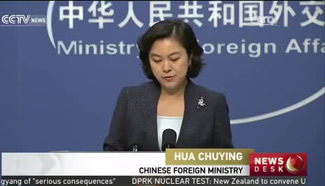by Xinhua writer Liu Xin
BEIJING, Sept. 10 (Xinhua) -- The digital age has had a huge impact on the way we consume. From data to shopping to leisure, not only do smart devices offer convenience but they are giving traditional media -- TV, newspapers -- a run for their money.
Penguin Intelligence, in cooperation with Tencent, JD.com, and MobileQuest, in August finished a survey that analyzed how 4,225 Rio Olympic Games audience members nationwide interacted with coverage of the Games.
The survey found that 40.8 percent of content about the Olympics was accessed online, while television accounted for the lion's share with 49.4 percent.
Due to the multi-faceted nature of the Internet, it is gaining ground over television as the go-to consumption platform, according to the survey.
The numbers speak for themselves: The survey found that one third of those surveyed said social media was the main conduit through which they accessed coverage of the Olympic Games, and 60.5 percent used social media to share stories, videos and memes of the international sporting event.
Over 30 million Olympic-related posts were shared on social media, according to the survey, and, of the 4,225 respondents, almost 80 percent accessed coverage of the Games with a smart phone.
According to sina.com, a videoclip of Chinese female swimmer Fu Yuanhui had rung up four billion clicks across all of Sina's platforms within two days of its release.
"That was my personal best!" Fu screamed in the video after her 100m backstroke semifinal.
"I was very sick at the beginning of the year. The devil knows what I went through. Honestly, when I was training in Australia, I might as well have been dead. Today's result makes it all worthwhile. I'm very happy."
When sports commentator Su Dong moved from TV to new media in 2010, he was shocked by how differently the two approached sports broadcasting.
"Nowadays, Chinese want to know more about athletes' training and lives, not just their performance," Su said.
"New media and social media understood this shift and used it to their advantage," Su analyzed. "Fu's interview was broadcast by CCTV (a state-run national TV broadcaster), but it was the social networks that spread it."
The Olympic Games, being a quadrennial event, attracts a lot of attention for a short period of time. However, the same consumption shift has also been seen in the way people follow conventional sporting events such as the English Premier League (EPL) or the NBA.
PPTV, an online streaming site, is one of the authorized new media broadcasters for EPL on the Chinese mainland. In the first three weeks of the season, PPTV received 20 million unique visitors (UV).
Footage of the games, including matches, interviews and highlights, won 48 million views, with 60 percent accessed through smart devices.
PPTV broadcasts three to four games for each week of the EPL season. An account with the site costs users 298 yuan (about 44.7 U.S. dollars) for the whole season.
China's leading online sports streaming site, LeSports, bought all the media rights on the Chinese mainland for Asian Football Confederation (AFC) games for the 2017-2020 period, at a cost of 110 million dollars.
One of the highlights of this period for the AFC games will be the 2018 World Cup qualification matches. This period will generate huge returns for LeSports, through live broadcasting of the qualification matches and other promotional products.
"The 'productization' of sport broadcasting is taking shape in China," Sina's senior vice president Wei Jianglei said during an interview with Xinhua. "Therefore, the products must have better quality."
Wei said new media had the power -- and technology -- to enrich the viewing experience.
"The current so-called 'Internet live' is just a shift from television to mobile devices," Wei said. "There is far more to new media sports broadcasting than this."
Internet live is attractive to the tech-savvy viewers of today, they want to feel like they can participate in the game in some way, Wei explained.
"This can be achieved through forums, or commenting systems. The audience want to discus the players' performance, chat with other fans, and make new friends."
As for the EPL, there are three online live forums for each game, in Mandarin, Cantonese, and English, and viewers could choose their preferred commentary language.
"Something like this is almost impossible on television," Su said.
Su acknowledged the diversified sports news content pushed and produced by online entities, but he called for more in-depth stories to also be made available alongside the videos.










